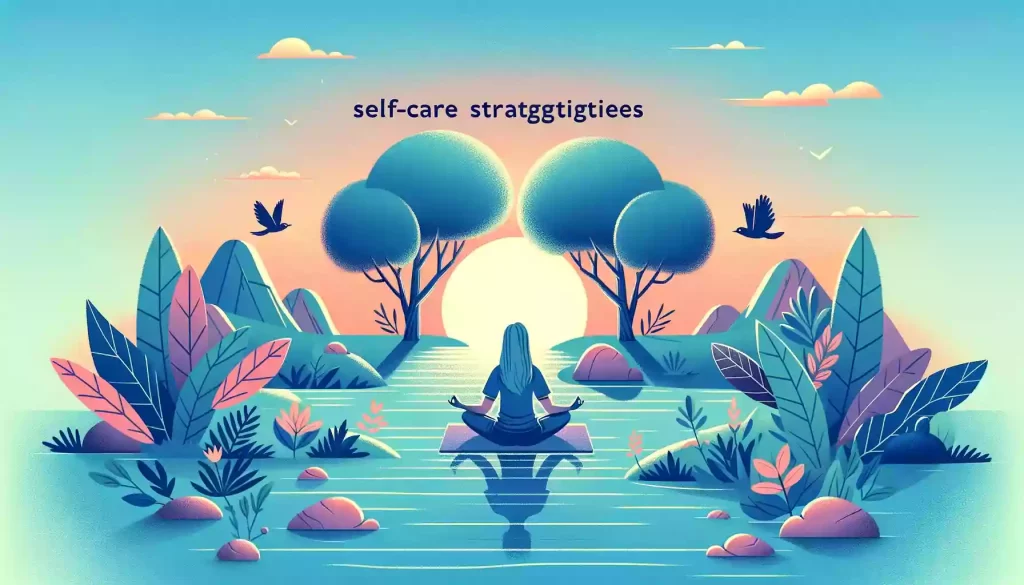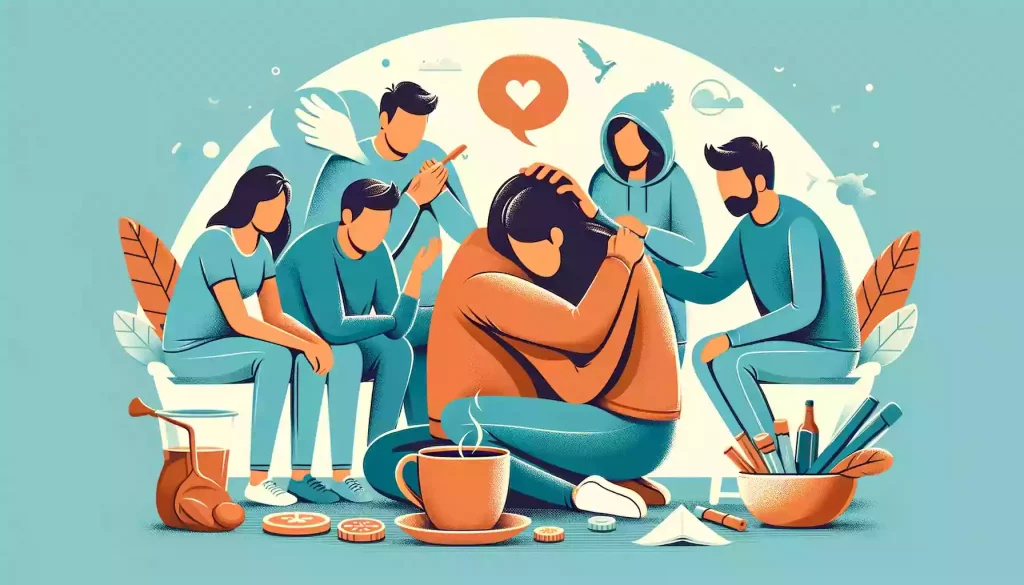Understanding Breakup Anxiety
Key Takeaways:
- Breakup anxiety is a normal emotional response to the end of a relationship.
- Recognizing the signs of this anxiety is crucial for effective management and recovery.
- Self-care, social support, and professional help can play significant roles in overcoming breakup anxiety.
Breakup anxiety is a common yet often overlooked emotional state that many people experience after the end of a significant relationship. It's a form of stress and anxiety that arises from the loss of a partner, the change in daily routines, and the uncertainty about the future.
This type of anxiety can manifest in various ways, ranging from mild discomfort and sadness to severe emotional distress. It's crucial to understand that feeling anxious, confused, or lost during this time is a normal response to a significant life change.
The experience of breakup anxiety varies widely among individuals. For some, it might be a fleeting sense of sadness, while for others, it can lead to profound feelings of emptiness and despair. Recognizing these feelings as a natural part of the healing process is the first step towards recovery.
One of the key aspects of managing breakup anxiety is acknowledging the impact it has on your mental and emotional well-being. This recognition allows you to take proactive steps towards healing, such as engaging in self-care practices, seeking support from friends and family, and if necessary, consulting a mental health professional.
In the following sections, we'll explore various strategies and tips to effectively manage and overcome breakup anxiety, enabling you to move forward with resilience and hope.
Recognizing the Signs of Breakup Anxiety

Identifying the signs of breakup anxiety is a critical step in addressing it. This type of anxiety can manifest in different forms, and being aware of these symptoms can help you take the right steps towards healing. Common signs include persistent sadness, excessive worry about the future, difficulty concentrating, and changes in sleep or appetite.
Emotional symptoms are often the most noticeable. You might find yourself feeling overwhelmed by emotions, experiencing mood swings, or feeling unusually irritable. It's also common to ruminate on the past relationship, leading to a sense of being stuck or unable to move forward.
Physical symptoms can also accompany breakup anxiety. These might include fatigue, headaches, stomach issues, or a general feeling of being unwell. It's important to recognize that the mind and body are interconnected, and emotional distress can manifest physically.
Social changes are another key indicator. After a breakup, you might withdraw from social activities, find it hard to enjoy time with friends, or feel disconnected from your usual social circles. Recognizing these changes is crucial in understanding the full impact of breakup anxiety on your life.
The Emotional Rollercoaster: Navigating Through
The journey through breakup anxiety often resembles an emotional rollercoaster, filled with highs and lows. Understanding this pattern is vital for navigating through these turbulent times. The first step is accepting that these emotions are part of the healing process.
It's common to experience a range of emotions, from sadness and anger to relief and even happiness. These feelings may seem contradictory, but they are all part of the complex process of moving on. Allow yourself to feel these emotions without judgment.
During this period, you might encounter triggers that bring back memories of the relationship. These can be places, songs, or even certain dates. Being aware of these triggers and developing strategies to cope with them can help in managing your emotions more effectively.
Another aspect of this rollercoaster is the fluctuation in your sense of self. A breakup can lead to questioning your identity and worth. Rebuilding this sense of self is crucial and involves rediscovering your interests, values, and what brings you joy independently of your past relationship.
Finally, finding healthy ways to express and process your emotions is key. This might involve talking to friends, journaling, or engaging in creative activities. Remember, it's normal to have good days and bad days, and with time, the intensity of these emotions will lessen.
Self-Care Strategies to Manage Anxiety

Self-care is vital in managing breakup anxiety. It involves activities and practices that nurture your mental, emotional, and physical well-being. These strategies can help you regain a sense of control and peace in your life.
Firstly, prioritize your physical health. This includes getting enough sleep, eating nutritious foods, and engaging in regular exercise. Physical activity, in particular, is a powerful tool for reducing stress and improving mood, thanks to the endorphins released during exercise.
Mental and emotional self-care are equally important. Practices like mindfulness and meditation can help calm your mind and reduce feelings of anxiety. Additionally, creative outlets such as writing, painting, or playing music can provide a therapeutic way to express and process your emotions.
Setting boundaries is also a key aspect of self-care. This might mean limiting contact with your ex-partner or avoiding certain social media platforms that may trigger painful emotions. Remember, it's okay to take space for yourself.
Developing a routine can bring a sense of normalcy and stability to your life. This routine might include time for work, self-care activities, socializing, and relaxation. The predictability of a routine can be comforting during times of emotional turmoil.
Lastly, don't hesitate to indulge in activities that bring you joy and relaxation. Whether it's a hobby, spending time with loved ones, or simply enjoying a quiet evening alone, these moments are crucial for emotional recovery.
Rebuilding Your Self-Esteem Post-Breakup
A breakup can significantly impact your self-esteem. Rebuilding this aspect of your well-being is crucial for moving forward. Start by recognizing your self-worth independent of any relationship.
Reflect on your strengths and accomplishments. Making a list of things you like about yourself, your achievements, and qualities you are proud of can boost your self-esteem. It's also helpful to set small, achievable goals to build confidence.
Surrounding yourself with positive influences is essential. Spend time with friends and family who uplift and support you. Their encouragement can be a powerful reminder of your value and strength.
Finally, practicing self-compassion is key. Be kind and understanding towards yourself, especially when you're feeling low. Remember, healing takes time, and it's okay to be gentle with yourself during this process.
The Importance of Social Support During Tough Times

Social support plays a crucial role in overcoming breakup anxiety. It involves the emotional, informational, and practical assistance received from friends, family, and even professional networks. This support can significantly impact your ability to cope with the stress and emotional turmoil of a breakup.
Emotional support from loved ones can provide a sense of belonging and security. It's comforting to know that you're not alone and that others care about your well-being. Sharing your feelings with someone who listens empathetically can be incredibly healing.
Informational support, such as advice and guidance from others who have been through similar experiences, can provide valuable insights. It can help you navigate the complexities of your emotions and offer different perspectives on handling the situation.
Practical support, like help with daily tasks or providing a place to stay, can be a lifeline during this challenging time. It allows you to focus on healing without the added stress of life's logistics.
Joining support groups, either in person or online, can also be beneficial. These groups provide a safe space to share experiences and learn from others who are facing similar challenges.
It's important to be proactive in seeking social support. Reach out to friends and family, join clubs or groups that align with your interests, or consider volunteering. These activities not only provide social interaction but also help rebuild your sense of purpose and identity.
However, it's also crucial to recognize when social support might not be enough. If you find that your anxiety is overwhelming or persistent, it might be time to seek professional help.
Finally, remember to reciprocate the support you receive. Being there for others not only strengthens your relationships but can also enhance your own sense of self-worth and fulfillment.
When to Seek Professional Help
While friends and family can provide invaluable support, there are times when professional help is necessary. Recognizing when to seek this help is key to your emotional well-being.
If you find that your anxiety is significantly impacting your daily life, such as your ability to work, maintain relationships, or take care of your health, it's a sign to consider professional intervention. Persistent feelings of sadness, hopelessness, or thoughts of self-harm are also clear indicators that you need more support than what your social circle can provide.
Professional help can come in many forms, including therapy, counseling, or even medication under the guidance of a healthcare professional. A mental health professional can offer objective, non-judgmental support and provide strategies to cope with your emotions in a healthy way.
Seeking professional help is a sign of strength, not weakness. It demonstrates a commitment to your well-being and a willingness to take the necessary steps towards healing and recovery.
Moving On: Tips to Start Afresh

Moving on after a breakup can be challenging, but it's also an opportunity for growth and new beginnings. Here are some tips to help you start afresh.
Firstly, accept that it's okay to leave the past behind. Letting go of what was and embracing what could be is a significant step towards moving on. Acknowledge the lessons learned from the relationship and use them to shape a better future.
Create new routines and habits. Establishing a new daily routine can help you break free from the past and make room for new experiences. This might include exploring new hobbies, joining clubs, or traveling.
Focus on self-discovery. Spend time getting to know yourself again. This can involve trying new things, pursuing interests you may have neglected, and exploring new aspects of your personality.
Setting new goals is also important. Whether they're personal, professional, or health-related, goals can provide direction and a sense of purpose. They also give you something to work towards, which can be incredibly motivating.
Reconnect with old friends or make new connections. Socializing can be a great way to get support, share experiences, and even create new memories. Don't underestimate the power of community in healing and moving forward.
Finally, give yourself permission to find happiness again. It's okay to laugh, have fun, and enjoy life. Embrace the present moment and the potential for joy it brings.
Remember, moving on is a journey, not a destination. It's about taking one step at a time towards a future filled with new possibilities and happiness.
The Role of Mindfulness and Meditation
Mindfulness and meditation can be powerful tools in managing breakup anxiety and fostering emotional healing. These practices help you stay grounded in the present moment and reduce stress.
Begin with mindfulness, which is the practice of being fully present and engaged in the moment, without judgment. Start by noticing the small details of your daily life, like the taste of your food or the sensation of the air on your skin.
Meditation, on the other hand, involves focusing your mind to achieve a mentally clear and emotionally calm state. This can be done through guided meditations, breathing exercises, or sitting quietly and observing your thoughts without attachment.
Practicing mindfulness and meditation can help reduce feelings of sadness and anxiety. By focusing on the present, you're less likely to dwell on past regrets or future worries.
These practices also enhance self-awareness, allowing you to better understand your emotions and triggers. This understanding can be crucial in managing your reaction to challenging situations.
Incorporate mindfulness and meditation into your daily routine. Even a few minutes a day can make a significant difference in how you feel and cope with stress.
Finally, remember that mindfulness and meditation are skills that improve with practice. Be patient with yourself as you learn to navigate these practices. Over time, they can become invaluable tools in your journey towards healing and emotional well-being.
Creating a Positive Future Post-Breakup

Creating a positive future after a breakup is about embracing change and looking forward with hope. Here are some ways to build a fulfilling life post-breakup.
Start by envisioning the future you want. Think about your goals, dreams, and what a happy life looks like for you. This vision can guide your decisions and actions moving forward.
Take proactive steps towards your goals. Break them down into smaller, manageable tasks, and start working on them one at a time. Every small step counts and brings you closer to the future you desire.
Invest in personal growth. This can include learning new skills, reading, attending workshops, or simply spending time reflecting on your experiences and what you've learned from them.
Build new relationships and strengthen existing ones. Social connections are vital for emotional well-being. Be open to meeting new people and nurture the relationships that are important to you.
Embrace new experiences and be open to change. Trying new things can bring joy and excitement into your life, and help you discover aspects of yourself you might not have known before.
Finally, practice gratitude. Focusing on the positive aspects of your life can shift your perspective and foster a sense of happiness and fulfillment.
FAQs: Common Questions About Breakup Anxiety
Q: Is it normal to feel anxious after a breakup?
A: Yes, feeling anxious after a breakup is a common and normal response. It's a significant life change, and it's natural to feel uncertain about the future.
Q: How long does breakup anxiety last?
A: The duration of breakup anxiety varies for each individual. For some, it may last a few weeks, while for others, it might take months. It's important to allow yourself to heal at your own pace.
Q: Can breakup anxiety affect physical health?
A: Yes, emotional stress can manifest physically. Symptoms can include changes in appetite, sleep disturbances, fatigue, and other physical discomforts.
Q: Should I stay in contact with my ex if I'm feeling anxious?
A: This depends on your individual situation. For some, maintaining contact can prolong the healing process. It's important to do what feels right for you and your emotional well-being.
Q: How can I support a friend going through breakup anxiety?
A: Be a supportive listener, offer emotional support, and encourage them to engage in self-care and seek professional help if necessary.
Q: Is it okay to date again soon after a breakup?
A: There's no right or wrong time to start dating again. It's important to feel emotionally ready and healed from your past relationship before entering a new one.
Q: When should I seek professional help for breakup anxiety?
A: If your anxiety is overwhelming, persistent, and affects your daily life, it's a good idea to seek professional help.
Key Takeaways: Embracing Change and Finding Peace

As we conclude this guide on managing breakup anxiety, let's summarize the key takeaways that can help you embrace change and find peace.
1. Recognize and Accept Your Feelings: Understand that it's normal to experience a range of emotions after a breakup. Accepting these feelings as part of the healing process is crucial.
2. Engage in Self-Care: Prioritize your physical, mental, and emotional well-being. Activities like exercise, meditation, and spending time on hobbies can significantly aid your recovery.
3. Lean on Your Support System: Don't hesitate to reach out to friends and family for support. Their understanding and empathy can be invaluable during tough times.
4. Seek Professional Help When Needed: If your anxiety feels overwhelming, consider seeking help from a mental health professional. They can provide guidance and support tailored to your needs.
5. Embrace New Beginnings: Use this time as an opportunity for personal growth and self-discovery. Embracing new experiences can lead to a fulfilling and joyful life post-breakup.
6. Practice Patience and Compassion with Yourself: Healing is a journey that takes time. Be kind to yourself and remember that moving on is a process that happens gradually.
While coping with breakup anxiety can be challenging, it also presents an opportunity for personal growth and new beginnings. By embracing these key strategies, you can navigate this difficult time with resilience and hope, ultimately finding peace and a renewed sense of self.
Recommended Resources
- Getting Past Your Breakup: How to Turn a Devastating Loss into the Best Thing That Ever Happened to You, Susan J. Elliott, Da Capo Lifelong Books, 2009
- The Breakup Bible: The Smart Woman's Guide to Healing from a Breakup or Divorce, Rachel Sussman, Harmony, 2011
- It's Called a Breakup Because It's Broken: The Smart Girl's Break-Up Buddy, Greg Behrendt & Amiira Ruotola-Behrendt, Broadway Books, 2005







Recommended Comments
There are no comments to display.
Create an account or sign in to comment
You need to be a member in order to leave a comment
Create an account
Sign up for a new account in our community. It's easy!
Register a new accountSign in
Already have an account? Sign in here.
Sign In Now